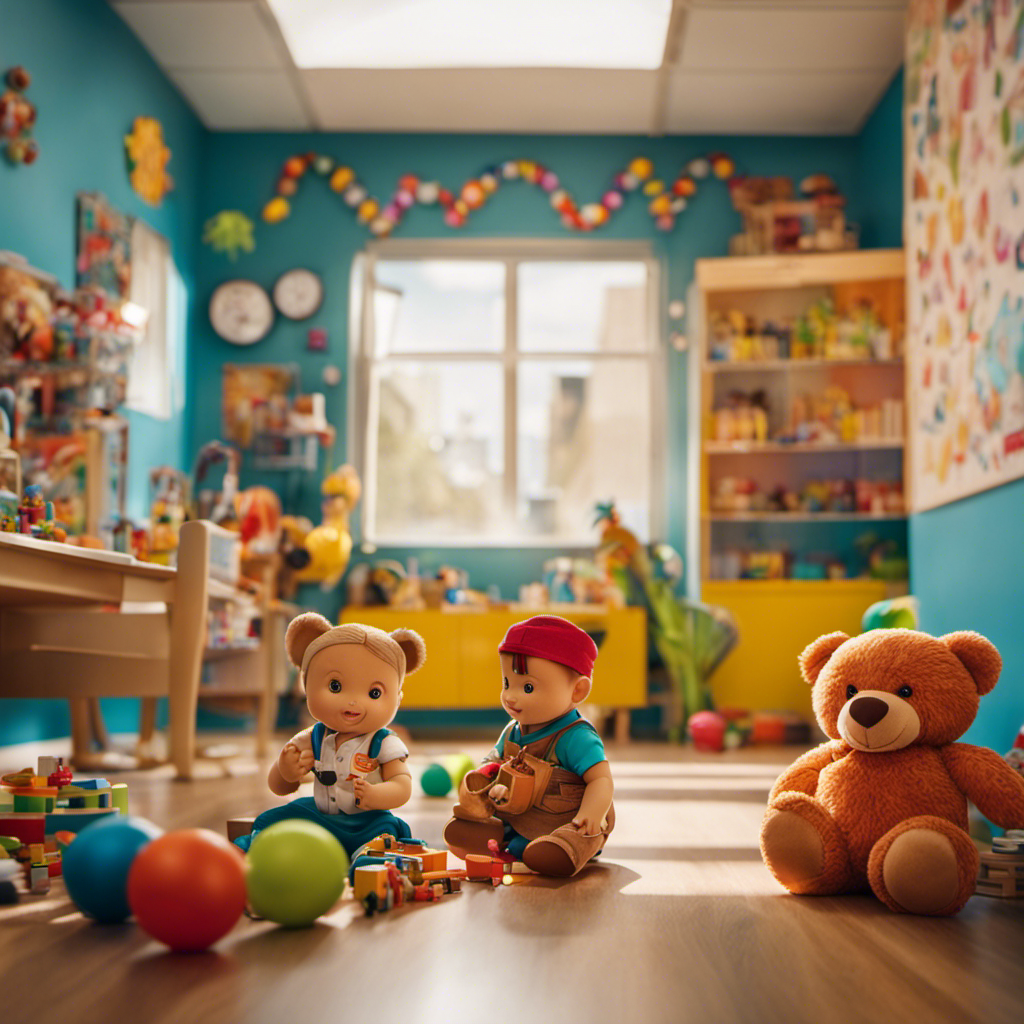Are you curious about the world of pediatricians? Get ready to be amazed by these 10 fun facts!
You’ll discover the incredible education and training that pediatricians undergo, their crucial role in preventive care, and their expertise in child development.
Plus, we’ll explore the fascinating relationships between pediatricians and their young patients.
From specialized fields to surprising medical knowledge, pediatricians are true superheroes.
Join us on this exciting journey as we delve into the captivating world of these remarkable healthcare professionals!
Key Takeaways
- Pediatricians use trust-building activities and communication strategies to establish a strong relationship with their young patients.
- They employ play therapy, open dialogue, and child-friendly language to communicate effectively with children.
- Pediatricians provide insights into child development and help children reach important milestones.
- They undergo subspecialty training to provide specialized care for complex medical conditions and contribute to the field through research.
Interesting Facts About Pediatricians
Here are some interesting facts about pediatricians:
- Pediatricians are medical doctors who specialize in the care and treatment of infants, children and adolescents. They deal with everything from preventive care to serious illnesses and injuries.
- It takes a minimum of 13 years of education and training to become a pediatrician in the United States. This includes 4 years of medical school, 3 years of residency training in pediatrics, and optional fellowships for 1-3 more years in a pediatric subspecialty.
- Pediatricians have to take board certification exams through the American Board of Pediatrics in order to practice independently. They must renew this certification every 7-10 years.
- Some common subspecialties for pediatricians include neonatology (newborns), adolescent medicine, pediatric cardiology, pediatric oncology (cancer), pediatric surgery, child abuse pediatrics, and developmental-behavioral pediatrics.
- Pediatricians often work closely with schools, counselors, childcare providers and social workers to help monitor and support a child’s overall physical, emotional and social development.
- The field of pediatrics has expanded greatly in modern times. Some emerging subspecialties include pediatric hospital medicine, pediatric emergency medicine, pediatric psychology and pediatric palliative care.
- Pediatricians routinely administer immunizations to children and adolescents as a key part of preventive care. The CDC has a recommended schedule of over 20 different vaccinations from birth through 18 years.
- Pediatric medicine has made huge advances in reducing infant and child mortality rates in the past century. Vaccines, improved nutrition/public health, advanced medical technology and pharmacology have all contributed to this.
- Pediatricians have to communicate effectively with both their young patients and the parents/guardians. They often have to explain complex health topics in understandable ways and provide counseling on issues like nutrition, behavior and development.
Fun Facts About Pediatricians
Here are some fun facts about pediatricians:
- Pediatricians go through hours of mandatory playtime with toys, games, and books to become familiar with child development milestones. This helps them diagnose issues during well-visits.
- They have close relationships with lollipop makers – pediatric offices need tons of treats to reward good behavior during visits. The most popular flavors tend to be grape, cherry, and cotton candy.
- Pediatricians love silly jokes and have an arsenal ready for scared or crying kids. Knock-knock jokes, tongue twisters, and one-liners help lighten the mood.
- The iconic kid’s reflex hammer with the clown face on one side is used in nearly every pediatrician’s office during checkups. Some doctors personalize them with stickers or stripes.
- To inspect inside ears, noses, and throats, pediatricians have collecting drawers full of different sized otoscopes, tongue depressors, and popsicle sticks.
- Pediatricians are skilled contortionists, often having to maneuver into awkward positions to examine squirmy, playful children. Yoga and core strength are a plus.
- At least a few times a week, a pediatrician will have a child mistakenly call them “mommy” or “daddy” – kids often get attached to their caring doctor.
- Pediatricians have a sixth sense for detecting “fake coughs” – coughs kids manufacture on purpose to get out of going to school. The doctors play along to make the kids feel clever.
- Pediatricians love placing stickers on kids after exams, but often end up covered in stickers themselves by the end of a workday from little pranksters.
- To connect with kids, pediatricians have to keep up with the latest toys, TV shows, video games and books. They’re kid culture experts.
Fun Facts About Being a Pediatrician
Here are some fun facts about being a pediatrician:
- Pediatricians get to spend their days with kids – no stuffy board meetings or boring adult conversations! Interacting with children’s curiosity, humor and energy keeps the job lively.
- They witness a lot of childhood firsts – a baby’s first steps, a child’s first words, and those precious first birthdays. Pediatricians are part of many milestone moments.
- Pediatricians often decorate their offices with fun themes to make them less clinical and more kid-friendly. Exam tables might look like fire trucks, fish tanks adorn waiting rooms, and there are plenty of toys too.
- They have to keep up on trends in children’s pop culture, from the latest TV shows and video games to popular toys and books. This helps them connect better with their patients.
- Pediatricians get to encourage healthy habits in fun ways, like handing out stickers for eating vegetables or using superhero bandaids to make shots less scary.
- It’s a very rewarding career seeing sick children get better under their care. Pediatricians develop special bonds with families who can stay under their care for decades.
- Work is rarely boring when toddlers are running around half-dressed, teens are glued to phones, and you have to entertain babies during exams. There’s always something amusing with kids.
- Pediatricians are sleuths too – listening for subtle clues from kids and piecing together symptoms to solve health mysteries. It involves creativity and problem-solving skills.
- There’s lots of variety, from giving sports physicals, diagnosing rare illnesses, to performing minor surgeries and setting broken bones. Kids keep pediatricians on their toes!
The Education and Training of Pediatricians
Pediatricians undergo extensive education and training to provide specialized care for children. To become a pediatrician, you must complete several years of schooling and pass various exams.
It all starts with medical school, where you learn the foundations of medicine and gain a broad understanding of different specialties. After that, you’ll need to fulfill your pre-med requirements before applying to pediatric residency programs.
During these programs, you’ll spend several years working directly with patients under the guidance of experienced pediatricians. This hands-on experience is crucial for developing your clinical skills and knowledge.
Once you’ve completed your residency, you’ll need to pass the pediatric board exams to obtain certification in pediatrics. But learning doesn’t stop there – pediatricians are committed to lifelong learning through continuing education and fellowship programs, ensuring they stay up-to-date with the latest advancements in child healthcare.
The Role of Pediatricians in Preventive Care
Parents should be aware of the significant role that pediatricians play in preventive care for children. Pediatricians are not just doctors; they are partners in your child’s well-being, working to ensure their physical and emotional health. They employ various trust-building techniques and communication strategies to create a comfortable environment where your child feels safe and cared for.
Let’s take a look at some ways pediatricians build trust with their young patients:
| Trust Building Techniques | Communication Strategies |
|---|---|
| Use child-friendly language | Listen actively |
| Engage in play therapy | Explain procedures clearly |
| Promote open dialogue | Provide reassurance |
Pediatricians’ Expertise in Child Development
Through their extensive knowledge and experience, pediatricians are able to provide valuable insights into child development. They play a crucial role in helping children reach important milestones and ensuring their overall growth and well-being.
Pediatricians understand that each child is unique and develops at their own pace. They can identify any delays or concerns early on, allowing for timely intervention through specialized programs. Early intervention is key to addressing developmental issues as it maximizes a child’s potential for growth and success later in life.
These programs focus on providing appropriate support, therapies, and resources tailored to the specific needs of the child. By working closely with families, pediatricians create a nurturing environment where children can thrive and achieve their full potential.
Fun Facts About Pediatrician-Patient Relationships
Are you interested in learning how pediatricians build trust with their young patients?
In this discussion, we will explore some fun and innovative trust-building activities that pediatricians use to create a positive doctor-patient relationship.
Additionally, we will delve into the communication techniques employed by these skilled professionals to ensure effective and open lines of communication with children and their families.
Trust-Building Activities
To build trust with your child’s pediatrician, try engaging in fun activities during their visits. This not only helps to create a positive and enjoyable experience for your child but also fosters a sense of connection and trust between you, your child, and the pediatrician.
Here are some communication techniques and trust-building strategies that you can incorporate into these activities:
- Playful storytelling: Encourage your child to tell stories about their day or favorite things while the pediatrician listens attentively. This creates a safe space for open communication.
- Pretend play: Engage in role-playing scenarios where the pediatrician pretends to be a patient while your child acts as the doctor. This encourages empathy and understanding.
- Artistic expression: Provide art supplies for your child to create drawings or paintings related to their health experiences. This allows them to express their emotions creatively.
- Games and puzzles: Bring along age-appropriate games or puzzles that both you and your child can enjoy with the pediatrician. This promotes teamwork and problem-solving skills.
Communication Techniques
Engaging in playful storytelling and pretend play during pediatrician visits creates a safe space for open communication with your child. By using creative communication techniques, you can build trust and make the experience more enjoyable. Imagine sitting in a cozy waiting room filled with colorful toys and friendly staff, while your child’s imagination takes flight. As you enter the examination room, a table adorned with an assortment of props awaits you both. Together, you embark on an imaginative journey, acting out different scenarios related to their health. Through this interactive play, your child feels empowered and comfortable expressing their fears or concerns. This innovative approach fosters a sense of belonging, as it encourages active participation and strengthens the bond between parent and child. Trust-building activities like these pave the way for effective communication during pediatric visits.
| Communication Techniques | Trust Building Activities | Imagery |
|---|---|---|
| Storytelling | Pretend Play | Cozy |
| Active Listening | Open Dialogue | Colorful |
| Visual Aids | Empowerment | Friendly |
| Role-playing | Expressing Emotions | Imaginative |
| Nonverbal Cues | Fun Atmosphere | Participatory |
Pediatricians’ Work in Specialized Fields
Did you know that pediatricians undergo extensive subspecialty training to provide specialized care for children with complex medical conditions? These dedicated doctors acquire additional expertise in areas such as pediatric cardiology, oncology, and neurology, ensuring that they can effectively diagnose and treat a wide range of specialized pediatric medical conditions.
In the field of pediatric medicine, collaborations between different specialists are crucial for providing the best possible care to young patients. These collaborations lead to innovative approaches and improved outcomes in specialized care.
Pediatricians’ Subspecialty Training
Pediatricians often undergo subspecialty training to become experts in a specific area of child healthcare. This additional training allows them to provide specialized care and make significant contributions to the field.
� Pediatricians’ research contributions:
- By focusing on specific areas, pediatricians can conduct research that advances medical knowledge and improves treatments for children.
- Their research often explores innovative approaches and technologies, pushing the boundaries of pediatric healthcare.
� Pediatricians’ role in mental health:
- Many pediatricians specialize in child psychiatry, providing essential support for children’s mental well-being.
- They work closely with families and collaborate with mental health professionals to diagnose and treat various conditions, such as anxiety or ADHD.
As pediatricians receive subspecialty training, they gain expertise that goes beyond general practice. This enables them to offer cutting-edge care while making valuable research contributions and playing a crucial role in promoting children’s mental health.
With their dedication and expertise, pediatricians continue to shape the future of child healthcare.
Specialized Pediatric Medical Conditions
Many specialized pediatric medical conditions can be effectively diagnosed and treated by pediatricians with subspecialty training. In this field, there is an array of rare conditions that require unique expertise.
Pediatricians who specialize in these areas have the knowledge and skills to provide specialized treatments tailored to each child’s specific needs. These dedicated specialists possess a deep understanding of the complexities associated with these rare conditions. They are at the forefront of innovative research and advancements in treatment options. Their visionary approach ensures that children receive the best possible care, even for the most challenging cases.
For families facing such daunting circumstances, finding a pediatrician with expertise in their child’s condition is crucial for a sense of belonging within a supportive community. These highly trained professionals foster an environment where parents feel understood, valued, and empowered.
Collaborations in Specialized Care
Collaboration is essential in providing specialized care for children with complex medical conditions. When it comes to the well-being of these young patients, a team approach is key.
Here are some innovative strategies that can enhance collaboration among healthcare professionals:
- Trust Building Activities: Engaging in team-building exercises and fostering open dialogue can create a sense of trust among team members. This allows for better information sharing and decision-making.
- Communication Techniques: Utilizing clear and concise communication techniques, such as using visual aids or employing technology platforms, improves understanding between healthcare providers. This ensures that everyone involved in the child’s care is on the same page.
- Interdisciplinary Meetings: Regular meetings involving different specialties contribute to comprehensive treatment plans. These gatherings promote cross-disciplinary collaboration, resulting in holistic care for the child.
- Shared Decision-Making: Involving parents or guardians in decision-making processes fosters a sense of ownership and inclusion. This partnership ultimately leads to more effective treatment outcomes.
- Continued Education: Ongoing education and training opportunities enable healthcare professionals to stay up-to-date with advancements in their fields. This knowledge enhances collaboration by ensuring that all team members have access to current best practices.
The Importance of Pediatricians in Vaccination Programs
Did you know that pediatricians play a crucial role in vaccination programs? They are the unsung heroes behind successful vaccination campaigns and immunization efforts. Pediatricians have the knowledge and expertise to ensure that children receive the necessary vaccines to protect them from harmful diseases. They are at the forefront of promoting vaccine safety, educating parents about the importance of immunizations, and addressing any concerns or misconceptions they may have.
To paint a clearer picture, here is a table showcasing some key responsibilities of pediatricians in vaccination programs:
| Responsibilities | Examples |
|---|---|
| Vaccine administration | Administering vaccines to children |
| Vaccine schedule | Developing personalized vaccine schedules for each child |
| Vaccine education | Educating parents about vaccine benefits and risks |
| Vaccine storage | Ensuring proper storage and handling of vaccines |
| Vaccine advocacy | Advocating for policies that promote immunization |
Pediatricians are not just doctors; they are advocates for children’s health, ensuring their well-being through comprehensive vaccination programs. By working together with parents, communities, and healthcare organizations, pediatricians help create a safer environment where every child can thrive.
Surprising Facts About Pediatricians’ Medical Knowledge
It’s surprising to learn about the extensive medical knowledge possessed by these child doctors. Pediatricians are not just experts in treating children, but they also make significant contributions to medical research and the development of innovative technologies. These young physicians have a deep understanding of complex medical conditions and are constantly exploring new ways to improve healthcare for children.
Pediatricians play a crucial role in advancing medical knowledge through their research contributions. They conduct studies on various pediatric diseases, helping to uncover new treatments and interventions. Their dedication to finding better solutions has led to breakthroughs in areas such as childhood cancer, genetic disorders, and developmental disabilities.
In addition to their research efforts, pediatricians embrace innovative medical technologies that enhance the care they provide. From telemedicine platforms that allow remote consultations with patients to wearable devices that monitor vital signs in real-time, these child doctors are at the forefront of adopting cutting-edge tools that revolutionize pediatric healthcare.
Pediatricians’ Impact on Public Health Initiatives
As you delve into the world of pediatricians’ impact on public health initiatives, you will discover their crucial role in promoting child vaccination and addressing childhood obesity.
With their expertise and dedication, pediatricians play a pivotal role in educating parents about the importance of vaccinating their children, ensuring a healthier future for all.
Additionally, they work tirelessly to combat the rising epidemic of childhood obesity by providing guidance on nutrition and physical activity, paving the way towards a healthier generation.
Promoting Child Vaccination
Pediatricians play a crucial role in promoting child vaccination. They are not only medical professionals but also trusted allies in ensuring the health and well-being of your child. With their expertise, they implement various trust-building activities to help you feel comfortable and confident about vaccinating your child.
Through open communication techniques, pediatricians address any concerns or misconceptions you may have, providing accurate information about vaccines and their benefits.
Here are some innovative ways pediatricians promote child vaccination:
- Hosting educational workshops for parents
- Creating informative brochures and flyers
- Utilizing social media platforms to share vaccine-related facts
- Collaborating with schools to conduct vaccination campaigns
- Organizing community events that highlight the importance of immunization
Addressing Childhood Obesity
You’ve learned about the importance of child vaccination, but now let’s dive into another crucial topic: addressing childhood obesity. As parents, it can be challenging to navigate your child’s health and ensure they develop healthy habits. But fear not! Pediatricians are here to guide you through this journey.
To tackle childhood obesity, pediatricians employ trust-building activities that foster a sense of belonging for both children and parents. These activities create a safe space where open communication thrives, allowing pediatricians to understand each family’s unique situation.
Pediatricians may organize fun group sessions where families come together to learn about nutrition, engage in physical activities, and share their triumphs and challenges. By building trust within these supportive communities, pediatricians empower families with the knowledge and tools needed to make lasting lifestyle changes.
Pediatricians’ Involvement in Community Outreach Programs
Did you know that pediatricians often participate in community outreach programs to provide medical care and education to underserved populations? These dedicated doctors are not only committed to the health of their young patients, but also to the well-being of the communities they serve.
Through community engagement, pediatricians create opportunities for individuals from all walks of life to come together and support one another. They believe in the power of volunteerism and encourage others to get involved as well.
These outreach programs offer valuable volunteer opportunities for individuals who want to make a difference in the lives of children and families. Whether it’s organizing health fairs, conducting educational workshops, or providing free medical check-ups, pediatricians actively contribute to building stronger and healthier communities.
Interesting Statistics About the Pediatrician Workforce
There’s an interesting statistic about the pediatrician workforce that reveals the growing demand for these dedicated doctors.
Did you know that the demographics of pediatricians are changing? In recent years, there has been a significant increase in diversity among pediatricians, reflecting the diverse communities they serve. This shift is essential in ensuring that children from all backgrounds receive culturally competent care and feel understood and valued.
Additionally, there has been a growing emphasis on work-life balance for pediatricians. Medical institutions now recognize the importance of allowing doctors to have time for themselves and their families, leading to improved job satisfaction and overall well-being. By prioritizing work-life balance, pediatricians can continue to provide exceptional care while also taking care of themselves.
Isn’t it great to see these positive changes happening within the field? Join us in celebrating this exciting progress!
Frequently Asked Questions
How Much Do Pediatricians Typically Earn?
Pediatricians typically earn a good salary. You might be curious about how much they make. Well, pediatrician salaries can be quite lucrative, allowing them to enjoy a comfortable lifestyle while caring for children.
What Are the Most Common Challenges That Pediatricians Face in Their Daily Work?
Balancing work life and managing difficult patient cases are common challenges pediatricians face. It requires juggling demanding schedules while providing compassionate care. However, through dedication and innovation, pediatricians create a nurturing space for their young patients, fostering a sense of belonging and healing.
Can Pediatricians Prescribe Medication for Children?
Yes, pediatricians can prescribe medication for children, but there are limitations. They consider alternative treatments and strive to provide the best care. You’ll find that their approach is both creative and innovative in addressing your child’s health needs.
Are There Any Risks or Potential Side Effects Associated With Common Pediatric Vaccinations?
When it comes to common pediatric vaccinations, there may be some risks and potential side effects. It’s important to have a discussion with your pediatrician about vaccination safety and any concerns you may have.
How Do Pediatricians Stay Up-To-Date With the Latest Medical Research and Advancements in Their Field?
To stay up-to-date, pediatricians like you attend continuing education opportunities and medical conferences. These events provide a chance to learn about the latest research and advancements in your field, ensuring you can provide the best care for your young patients.
Conclusion
Congratulations! You’ve just learned 10 fun facts about pediatricians.
From their extensive education and training to their expertise in child development, these doctors are true superheroes for kids.
They not only provide preventive care but also work in specialized fields and contribute to public health initiatives.
Pediatricians even engage in community outreach programs, making a positive impact on the lives of children everywhere.
So next time you visit your pediatrician, remember that they are not only knowledgeable but also dedicated to ensuring the well-being of your little ones.
Keep supporting these amazing healthcare professionals!





